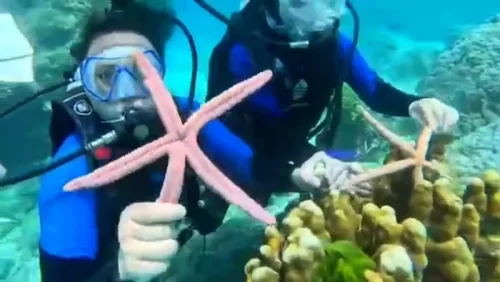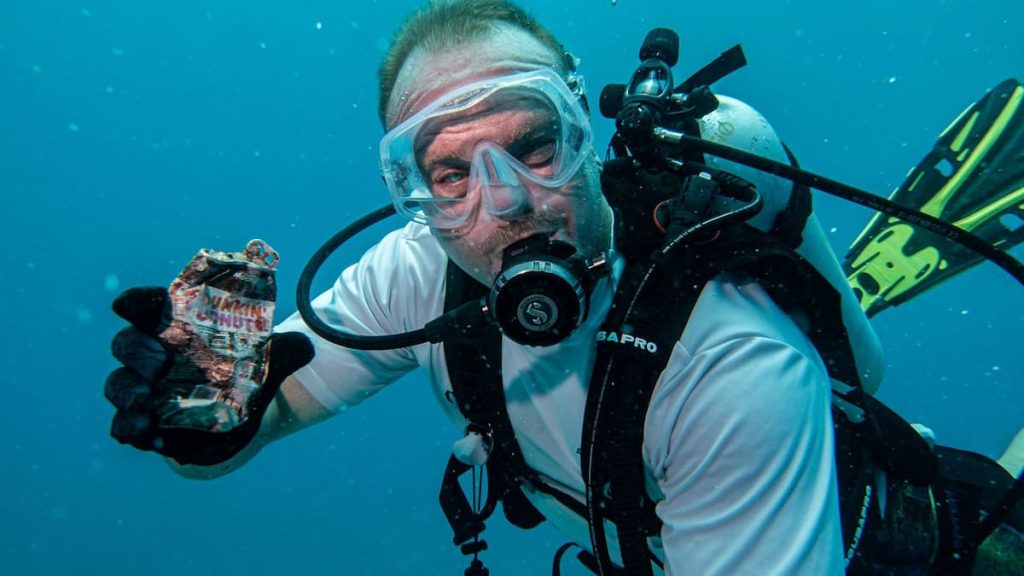Three Chinese tourists accused of playing with starfish and stepping on a coral reefs while diving in Phuket, Thailand facing up to two years in prison and a US$5600 fine after being charged with violating a marine preservation regulation.
The event, which occurred last week on the Thai island of Koh Racha, was brought to light by images published by a nonprofit that monitors environmental violations in the country.
In a Facebook post, Environment Minister Varawut Silpa-archa stated that two visitors admitted to the crime after handing themselves in to police, while the third suspect remained at large.
To find the lawbreakers, officials worked with the provincial tourism police, the maritime office, and the company that organised the trip, according to Varawut. He did not say whether the missing tourist was still being sought.
If proven guilty, the tourists face a two-year prison sentence and a 200,000 baht (US$5,670) fine.
The tour’s two-month-old travel company apologized for the actions of the visitors, who were part of a diving group, saying it was the company’s first junket and it “learned a lesson.”
The operator also vowed to enhance awareness among its passengers about not interfering with marine species, particularly Chinese who have previously been involved in similar events.
“Some of them find the animals cute and want to have pictures taken with them to show to their friends,” a company executive told The Phuket News. “On behalf of the company, we are deeply regretful that this has occurred.”
Thai social media users lashed out at “wild Chinese tour groups,” while others criticised the diving instructors for failing to adequately inform the guests about the rules.
Some expressed outrage that such incidents continue to occur despite law enforcement efforts.
Two Chinese tourists were detained in 2020 for using a spear gun to catch protected ornamental fish while snorkelling in central Thailand.
Lee Yeol-eum, a South Korean actress, was charged in 2019 for capturing endangered gigantic clams in a Thai national marine park while filming a reality TV show.
According to marine experts, rising sea temperatures and unrestrained tourism have harmed more than three-quarters of Thailand’s coral reefs.
The sandy beaches of the tourism-dependent country attracted 6.15 million foreign tourists, including over 700,000 Chinese, in the first quarter of this year.
Marine preservation regulation Thailand
Thailand has taken several steps to protect its marine ecosystems and promote marine preservation. Here are some key regulations and initiatives:
- Marine National Parks: Thailand has established numerous marine national parks to conserve and protect its marine biodiversity. These parks have specific regulations in place to control activities such as fishing, diving, and boating to minimize negative impacts on the marine environment.
- Fishing Regulations: The Thai government has implemented regulations to manage and regulate fishing activities in its waters. These regulations include fishing licenses, seasonal fishing bans, restrictions on fishing gear, and prohibited areas to protect vulnerable species and their habitats.
- Coral Reef Protection: Thailand has taken measures to protect its coral reefs, which are crucial for marine biodiversity. Certain areas are designated as coral reef conservation zones, where activities like fishing, anchoring, and collecting marine life are prohibited or strictly regulated.
- Marine Debris Management: Thailand has recognized the importance of addressing marine pollution and has implemented measures to manage marine debris. These initiatives include public awareness campaigns, beach clean-up activities, and efforts to reduce plastic waste and single-use plastics.
- Endangered Species Protection: Thailand has legislation in place to protect endangered marine species, such as sea turtles and dugongs. It is illegal to harm, capture, trade, or consume these protected species.
- Sustainable Tourism Practices: The Thai government has been promoting sustainable tourism practices in marine areas to minimize the impact on marine ecosystems. This includes guidelines for tour operators and tourists to follow, such as responsible diving and snorkeling practices, waste management, and avoiding damage to coral reefs and other marine habitats.
It’s important to note that enforcement and implementation of these regulations can vary, and there may be ongoing challenges in effectively managing and preserving marine environments. It’s recommended to refer to the latest information from official government sources or local authorities for the most accurate and up-to-date regulations on marine preservation in Thailand.





